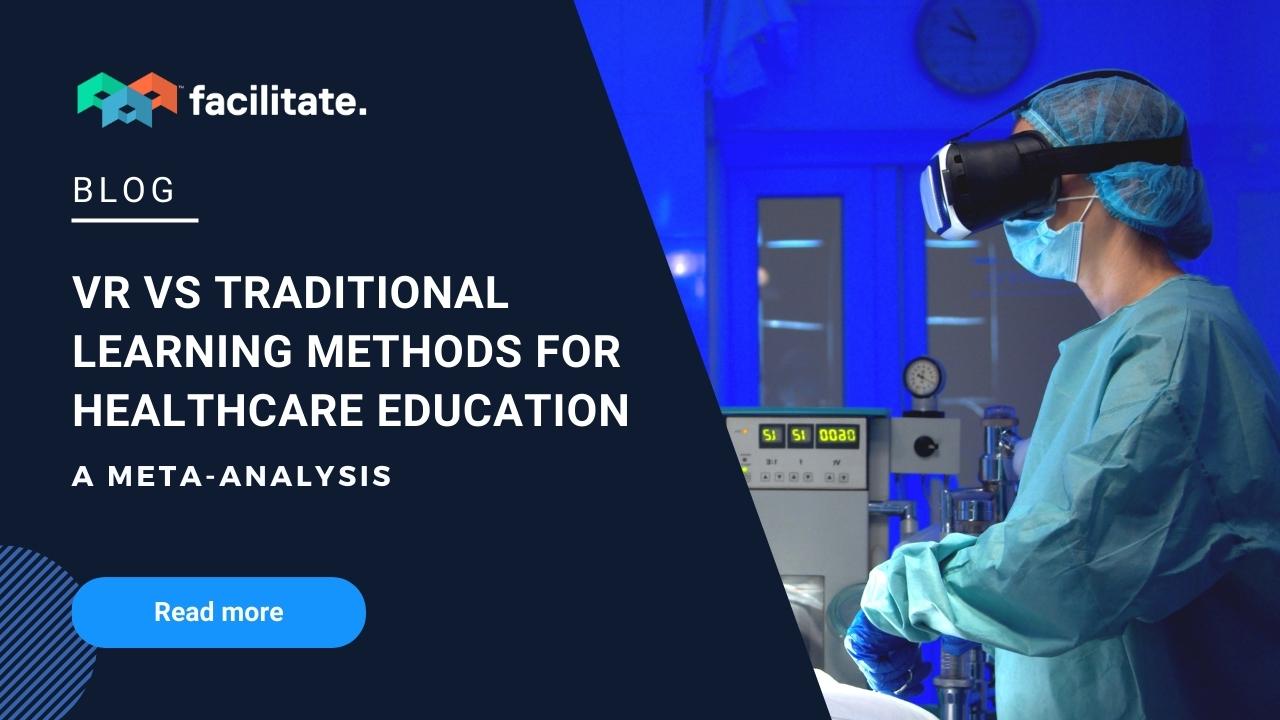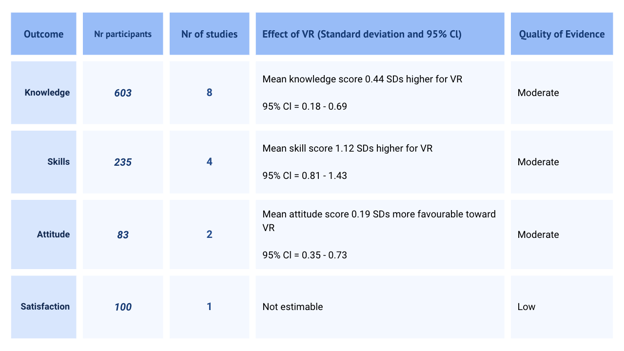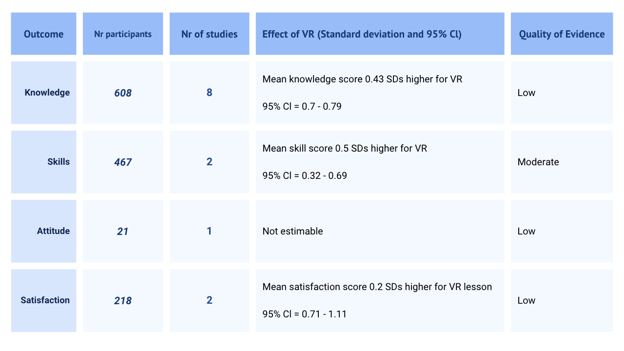VR vs Traditional Learning Methods for Healthcare Education: A Meta-analysis.

Virtual Reality (VR) has emerged as a cutting-edge technology with the potential to revolutionize learning experiences. In this blog post, we provide evidence for the improved efficacy of VR over traditional learning methods within healthcare education.
The Study: Comparing VR with Traditional Methods
This evidence is of the highest quality and comes from a peer reviewed meta analysis conducted by Kyaw et al. in 2019. They compared VR based learning to two types of traditional methods (in-person & textbook based) and (other digital learning such as computer/phone based). In particular, they compared the impact of VR across these four categories:
1. Learning of knowledge (cognitive domain)
2. Learning of skills, both motor skills and procedural (skills domain)
3. Learners' attitudes toward using VR for learning
4. Learners' satisfaction with using VR for learning
Being a meta-analysis, this study combined the results of 31 separate studies which in turn tested over 2000 learners. This type of study provides L&D practitioners with very robust evidence about the efficacy of VR for these learning domains.
In order to assess the quality of each individual study in this meta-analysis, Kyaw et al. utilized the GRADE (Grading of Recommendations, Assessment, Development, and Evaluations) framework. This approach is recommended as part of the Cochrane best practice guidelines and shows that this study is a very robust scientific investigation of VR's efficacy in real-life applications.
Study Findings and Insights
The findings are summarised in the two tables below.
Table 1 looks at VR compared to lectures and textbook based learning.
Table 2 looks at VR compared to other digital based learning such as eLearning on phone/computer.
The columns of most note in each table are: the 'Effect of VR' and the adjacent 'Quality of Evidence':
The Effect of VR column tells us:
- if those using VR produced better/worse learning outcomes
- how much better/worse these outcomes were
- The size of this effect is shown as a Standard Deviation, this tells us how much better/worse the average VR learner performed compared to the average traditional learner.
The Quality of Evidence column tells us:
- How much confidence can we have in the effect size for that learning domain, given the number of studies assessed, the overall number of learners tested and the quality of those studies. This is important, as can be seen, not all four aspects had equal numbers of studies or participants, which can effect the confidence of the outcomes.
-
- Quality of Evidence is given as Low, Moderate or High rating.

Table 2: Comparison of VR Learning with Other Digital Education Interventions (phone, computer-based eLearn)

Conclusion
This meta analysis covers a substantial part of the research base evaluating VR learning in the healthcare setting, and is likely the most comprehensive to date for this industry. The results are somewhat mixed; however, the below summations can be made overall:
Compared to traditional (non-digital) modalities:
1. A moderate level of evidence exists to show that learning in VR is more effective for knowledge-based learning
2. A moderate level of evidence exists to show that learning in VR is perceived more favourably than traditional modalities by learners
3. A moderate level of evidence exists to show that learning in VR is more effective for skills-based learning
Compared to other digital modalities:
1. A low level of evidence exists to show that learning in VR is more effective for knowledge-based learning
2. A low level of evidence exists to show that learning in VR is perceived as more satisfying than other modalities
3. A moderate level of evidence exists to show that learning in VR is more effective for skills-based learning
The results are mixed, as is always the case in real-world applied research, but overall, this research suggests there is good reason for organisations to be seriously considering using VR for learning.
Additionally, although the healthcare setting was the focus, the analysis examined effectiveness across common learning domains such as cognitive/knowledge-based and skills/psychomotor. This, combined with a large sample size and robust analysis, offers a reasonable amount of generalisability of these results to other industries which require learning in the cognitive and skill domains.
For more peer-reviewed, robust scientific evidence on the efficacy of VR learning and also why it is often more powerful, look at the Facilitate Whitepaper on this topic, available for free here..
References:
Kyaw, B. M., et al. (2019). Meta-analysis of the effectiveness of virtual reality-based interventions in healthcare education. Medical Education, 53(8), 799-809.
